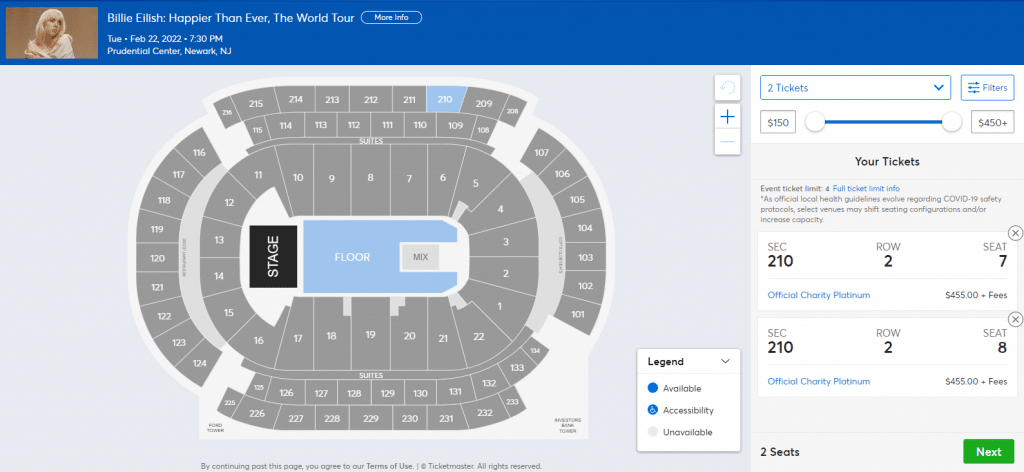
Throughout the course of the COVID-19 pandemic, the term New Normal has been bandied about as a choice cliché when discussing the ways in which we’ve had to adapt our lifestyles. Would the changes we adopted to mitigate the disease such as social distancing, mask wearing, Zoom meetings, and limits on large gatherings actually become permanent fixtures of society?
With these concerns thankfully subsiding as COVID appears to be under control for much of the world, more and more people have begun to enjoy activities in many of the same ways that they did before the pandemic put us in lockdown. However, the pause in activity could have provided the opportunity to usher in a true post-pandemic new normal; one in which the needs of customers are truly considered by sympathetic industries grateful to welcome their customers back after a year rife with stress, uncertainty, and significant hardship. Unfortunately, the concert industry, which was operating at all time highs in terms of volume and revenue before the pandemic, has decided to pick up right where it left off in treating its audience as an ATM, the sole purpose of which is to serve the bottom lines and special interests of the artists and to a more egregious extent, the associated live event rights holders.
A quick scan of the onsale for the upcoming Billie Eilish Happier Than Ever tour reveals an unsettling old-normal: The dirty trick of dynamic pricing hasn’t gone away. Just as the public is ready to flock back to live entertainment, they’re reminded of the things that they most abhor about the ticket buying experience. Under the dynamic pricing structure, almost immediately after tickets go on sale at Ticketmaster or other primary source, the price of inventory adjusts to keep up with demand and outpace the resale market. This ironically happens before a resale market even establishes itself, meaning that the primary ticket source in effect takes the lead in creating a secondary market. So, tickets in a section that may have gone for $200 at initial onsale will suddenly be $400 just a few minutes later. Ticketmaster will assign these dynamically priced tickets a hollow designation such as “Official Platinum”, which apparently is meant to add some element of extra prestige to the same tickets that somebody else paid half as much for perhaps just five minutes earlier. According to Ticketmaster, the term Official Platinum is meant to indicate tickets that are priced to adjust with the market, hence the term “dynamic” pricing. But, if you think that means that the price ever decreases, then I have a bridge to sell you along with your concert tickets. Rarely, if ever, and only under desperate circumstances, will ticket prices ever decrease under dynamic pricing.
The Billie Eilish camp has already faced heavy criticism for its dynamic pricing strategy, which comes after Eilish completely cancelled rather than postponed her 2020 tour due to COVID. If the tour had been postponed, then tickets that were already purchased would be honored for rescheduled dates. Instead, fans who bought tickets pre-pandemic, and at more reasonable prices were forced to attempt purchasing tickets anew, and in many cases at the over-inflated dynamic prices. By and large, fans appreciated cancellations because it meant that they got refunded rather than having to hold on to their tickets for an uncertain to-be-determined date. However, the Eilish rights holders could have provided those fans who purchased tickets for the cancelled tour with the opportunity to replace their tickets with tickets for the new tour, at the price they originally paid. It would not have been overly-complicated to accomplish this, as sports teams for example have taken various good-faith measures to ensure that their ticketholders are accommodated for tickets they had previously purchased after more than a year of cancelled and limited capacity games. With email addresses, credit card information, and ticket account data readily on file, providing replacement concert tickets would have actually been quite simple. In fact, it would have been an absolute boon in the name of great customer service if a prior Eilish customer was granted rights to tickets to the new tour for the same price paid for the previous tour, before they went on sale to the general public. But, Eilish decided to cash in- not to mention compensate for the refunds paid out -by putting the squeeze on her fans through a dynamic pricing scheme.
If the Official Platinum pricing is sneaky and disappointing, it can only be outdone by the Official Charity Platinum tickets for the Eilish tour that Ticketmaster is dangling out to her audience. Under this model, prices for tickets, for instance a $455 upper level ticket for her February 22nd show at Prudential Center in Newark, NJ, are hyper-inflated because they include a charitable component. So, don’t feel so bad that you’re getting ripped off because the money is going to charity! That’s not just sneaky and disappointing; it’s brazenly and explicitly offensive. Rage Against The Machine first introduced us to the “charity” ticket when it began selling for its comeback tour which ended up being postponed by COVID. This move made sense for the activists-laureate of rock music, even if the prices for these tickets were audacious, in some cases at more than $1,000 per seat for premium seats. Charity is wonderful and I have no problem rounding up my purchase at CVS to donate to the American Cancer Society, for example. By the same token I’m delighted to give whatever I can afford and even help to raise money for charities of my choice, that serve organizations that are in one way or another near and dear to my heart. But, does that mean I should be forced to pay what would likely amount to a 400% markup on tickets in the name of charity? If, say, an upper level ticket for a concert at Prudential Center would cost around $100 (still pricey for that kind of seat), would this mean I’m basically making a $355 donation per seat to charity? So, a $710 donation for two seats given to a charity of the artist’s choice? On what planet does somebody simply looking to buy concert tickets end up writing a $700 check to charity to go along with two nosebleed seats? That is manipulative to the point of blackmail.

By any standard, the cause that Eilish’s charity tickets support, at least in the NY/NJ area, Support and Feed, is incredibly worthy, and it deserves every penny it takes in. By providing plant-based meals to underprivileged communities Support and Feed offers essential nourishment to those in need while combatting climate change. Still, there are questions to be answered:
How much of the money does the charity actually get? Do I get the tax write off? If not, then who does? Do I have any say as to which charities get my contribution? Or am I basically required to give hundreds of dollars to the charity that the artist has arranged for? Pop music and charity have collaborated for as long as pop music has been around. Countless artists ally themselves with charities and use their concerts as platforms for promoting them. Bruce Springsteen highlights the efforts of local foodbanks in each city he plays and invites representatives from those foodbanks into his concerts to collect donations from his fans in attendance. Morrissey promotes PETA and other animal rights organizations at his concerts, where these organizations are allowed to set up tables in the lobbies and concourses at the venues so they can offer information and solicit donations. And, of course, Live Aid and countless other benefit concerts have raised millions upon millions of dollars for those in need. While artists can get overbearing in their charitable inclinations, the general feeling is that of true benevolence and the decision of whether or not to give, and if so, how much, is ultimately at the discretion of the fan.
Charitable giving is a deeply personal endeavor and if I’m going to be giving a significant amount over to charity, I need to not only have a connection to the organization I’m supporting but I require some solid idea as to how the money is being used. And, what if for whatever reason I happen to not agree with the charity that the artist is touting? Or, what if I support it but would still prefer hundreds of my dollars to go to a different charity if I was indeed going to donate that much? If the artist were to declare that $5 from every ticket sold for the tour was going to a charity of their choice, I would be all for it. But, tell me that I’m making a donation of hundreds (or even thousands) of dollars to a cause I may have never even heard of to justify the fact that I’m paying 4X the price that somebody else paid for the same type of ticket, then there’s a serious problem.
The touring industry had been setting records at the gate for the better part of a decade before the pandemic stopped it in its tracks. The explosion in touring activity was a byproduct of the free streaming frenzy which basically killed off album sales. In order to generate income, artists had to hit the road, and that included those who hadn’t produced any new material for decades. But, the touring machine was beginning to show signs of wear even before COVID hit. Madonna’s 2019 series of intimate club gigs sold so poorly that the Material Madame had to cancel dates and publicly decried her alarming drop in popularity. Chance The Rapper abruptly postponed and then eventually cancelled his entire arena tour altogether, citing a need to focus on family and create new music in the studio. This obviously does not happen when a tour is sold out. At around the same time, the Woodstock 50th Anniversary festival, which by all accounts should have been a fitting celebration of one of the most historic conjunctions of music and activism, was shelved because of legal red tape, political squabbles, artistic differences, and yes, public apathy. In that sense, is there an overwhelming demand for artists on the part of the audience? Or does the demand lie on the part of the artists, who require their audiences now more than ever? Because if the latter happens to be more true, then the fans need to be treated much, much better or else they won’t stick around for too long to help pay the bills. Perhaps this is all just a set of checks and balances placed on a public that had become too steadfast in its refusal to pay for recorded music anymore. Still, it’s an interesting question to consider when evaluating the true nature of supply and demand as it relates to touring. After all, was anybody really clamoring for a Genesis reunion (I mean, maybe if Peter Gabriel was involved…)?
After more than a year in the grip of a novel pandemic, which saw the loss of hundreds of thousands of lives, countless jobs, and the closing of untold numbers of businesses, it’s only natural that as we reemerge back to the normal we once knew, we’d all be looking to make up for lost time and in many cases lost money. The live entertainment industry, which was hit in particularly severe and unique ways throughout the whole ordeal doubtlessly feels a sense of urgency to get back to the trajectory it was on up through the beginning of 2020. Such is the case, the primary ticket market and event rights holders maintain that their practices of blatant price manipulation are justified so that they can protect themselves in the face of a resale market with unlimited upside profit potential. But, the resale market’s potential is in fact limited to what the market- the public -is willing to spend, which often times turns out to be at a loss. While sales for NBA and NHL playoff games have been pleasingly robust, especially in markets that allow close to full capacities as long as fans are vaccinated, sluggish sales on regular season NBA, NHL, and MLB games, even at drastically reduced capacities, is evidence that the fans, who have a lot of reconnecting to do with life in general, are not going to prioritize entertainment yet, especially at premium prices.
When we consider that the current political and cultural climate has shown us that people will speak out if they feel they’re being marginalized, it makes zero sense for the primary ticket market to treat its customers as rubes by subjecting them to unethical sales practices. If supply for tickets is limited and they get quickly sold out, then so be it. But if the goal is for us to collectively find a sense of pleasure once again after an incredibly anxious and depressing year, then immediately reintroducing event goers to the most detestable aspects of the ticket buying process is the absolute wrong way to bring about the New Normal.
###
This post originally appeared on LinkedIn, it is republished here with the author’s permission.
Charles Kaufman is the President and CEO Of SeatsLink.
I welcome your feedback on my articles, whatever your opinion may be. I’m fascinated by the ticket market as a facet of our overall economic landscape and often discuss my views in writing. Sometimes, I write not about tickets but other topics in sports, music, and entertainment. For tickets to any event, anywhere; including the best in sports, concerts, theatre, and more, please visit www.seatslink.com. I’m also happy to help you navigate these uncertain times, even if you just have a question about refunds and next steps regarding tickets you purchased. You can find out more information from the Seatslink Facebook page, and can get updates and information sent to your email by registering for the Seatslink mailing list!




